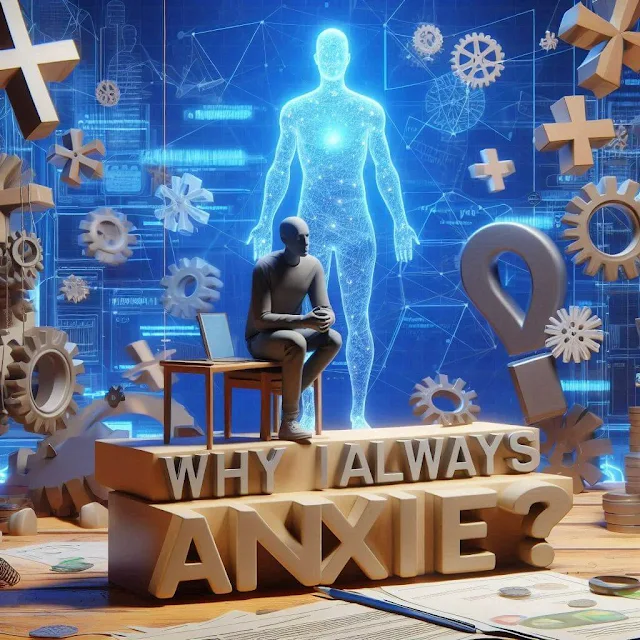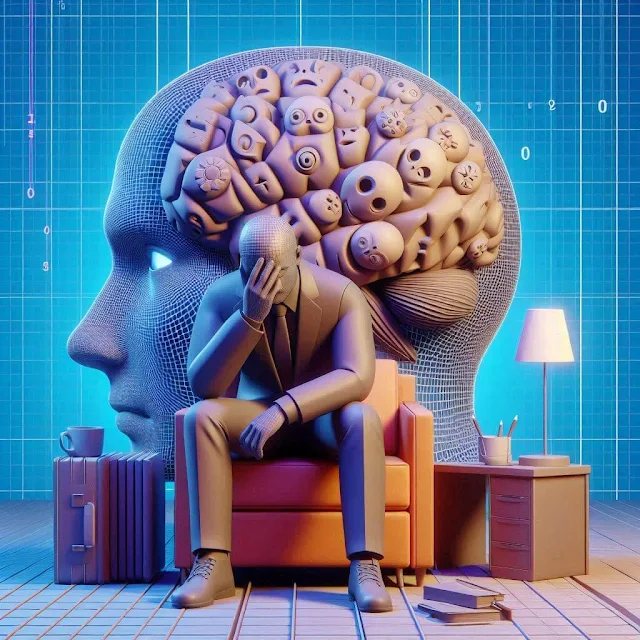- Get link
- X
- Other Apps
- Get link
- X
- Other Apps
1. What Is Psychological Anxiety?
Understanding the Basics
To be honest,
there were days
I felt anxious for no reason.
Like a tight knot
in my chest,
even when everything
seemed fine.
That’s when I realized—
this wasn’t just stress.
It was something deeper:
Psychological anxiety.
It’s a persistent,
intense feeling of fear
or uneasiness that lingers...
even when nothing's
really wrong.
Key Symptoms to Notice
If you often feel:
-
Racing thoughts that won’t stop
-
Chest tightness or fast heartbeat
-
Sleep trouble or restlessness
-
Irritability, tension, or nausea
-
A strong fear of something
you can’t explain...
You're not alone.
According to the National Institute of Mental Health (NIMH, 2024),
over 31% of adults in the U.S.
experience an anxiety disorder
at some point in their lives.
2. Why Do We Feel This Way?
Brain Chemistry & Genetics
There’s science behind it.
Anxiety is often linked
to an imbalance in brain chemicals
like serotonin, dopamine,
and cortisol.
These neurotransmitters
control how we react
to stress or danger.
When they’re out of sync,
your body may react
with fear—even
when nothing’s happening.
Oh, and yes—
genetics matter too.
If someone in your family
has anxiety or depression,
you might be more likely
to feel it too.
Life Events & Triggers
For me,
it started after a breakup
and a sudden job loss.
That mix of pain
and uncertainty
completely broke
my sense of safety.
Many people feel anxious
after trauma, major changes,
or chronic stress.
Even subtle things like
a toxic boss,
social pressure,
or financial struggles
can trigger deep anxiety
without warning.
3. How Anxiety Affects Daily Life
Your Body Can’t Tell the Difference
Here’s what’s wild—
your brain can’t always tell
real danger from imagined fear.
So even if nothing’s happening,
your body prepares to fight
or flee.
That means:
your heart races,
your muscles tense up,
and your stomach churns.
All because your brain thinks
you’re in danger.
Impact on Work, Health, and Relationships
It’s not just a mental thing.
Chronic anxiety
can mess with your sleep,
ruin your focus,
and weaken your immune system
over time.
It can make simple things—
like answering emails
or making phone calls—
feel unbearable.
And in relationships?
It can cause tension,
neediness, or withdrawal—
even when you want to connect.
4. Real Ways to Cope and Heal
Name It to Tame It
The first step?
Say it out loud.
“I feel anxious right now.”
That helps your brain
shift from reaction
to reflection.
According to psychiatrist
Dr. Dan Siegel (2023),
labeling emotions
can reduce amygdala activity
and calm the nervous system.
Breath Is Your Superpower
Seriously—
slow breathing changes everything.
Try this
-
Inhale for 4 seconds
-
Hold for 4
-
Exhale for 6
-
Repeat 5 times
You'll feel your body
shift out of panic
and into presence.
Move Your Body (Even a Little)
Walk around the block.
Stretch for five minutes.
Do jumping jacks in your pajamas.
Exercise releases endorphins,
which act like nature’s chill pill.
Cut the Noise
Too much news?
Toxic social media?
Overthinking?
Unplug a little.
Creating digital space
can lower cortisol
and restore mental clarity.
Professional Support
Therapy changed everything for me.
Talking to someone
who understands anxiety
without judgment
is incredibly freeing.
Options like CBT (Cognitive Behavioral Therapy)
and mindfulness-based therapy
have been proven effective
(APA, 2023).
And yes,
medication can help too—
when guided by a professional.
5. Is It Time to Get Help?
If anxiety is:
-
Interrupting your sleep
-
Making work feel impossible
-
Affecting your relationships
-
Or making you dread each day…
It’s okay to ask for help.
You don’t have to “tough it out.”
Help exists—
and healing is real.
6. A Quick Checklist for Anxiety Care
-
Did I sleep enough?
-
Am I hydrated?
-
Have I moved my body today?
-
Am I being kind to myself?
-
Have I unplugged recently?
-
Do I need to talk to someone?
Just one “yes”
can shift your whole day.
Psychological anxiety
isn't weakness.
It's your body asking
for safety.
And when you learn to listen—
and respond with care—
everything starts to change.
You're not broken.
You're human.
And you're not alone.
anxiety
brain health
breathing techniques
CBT
emotional care
mental health
psychological guide
stress relief
therapy
wellness
Location:
미국
- Get link
- X
- Other Apps



